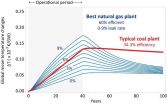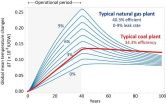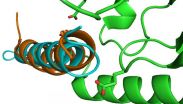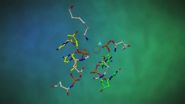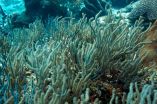(Press-News.org) Washington, D.C.-- Natural gas power plants produce substantial amounts of gases that lead to global warming. Replacing old coal-fired power plants with new natural gas plants could cause climate damage to increase over the next decades, unless their methane leakage rates are very low and the new power plants are very efficient.
These are the principal findings of new research from Carnegie's Ken Caldeira and Xiaochun Zhang, and Nathan Myhrvold of Intellectual Ventures that compares the temperature increases caused by different kinds of coal and natural gas power plants. Their work is published in Environmental Research Letters.
There is an ongoing debate among people concerned with power plants and the future of energy policy and greenhouse gas emissions. Does it makes sense to replace old coal-fired power plants with new natural gas power plants today, as a bridge to a longer-term transition toward near zero-emission energy generation technologies such as solar, wind, or nuclear power? A key issue in considering the decision has been the potential climate effects of natural gas versus coal. Studies have yielded different results by focusing on power plants with different characteristics and using different definitions of what it means to be "better" for climate.
Carnegie's Caldeira and Zhang, along with Myhrvold, aimed to identify the key factors that are responsible for most of the difference in greenhouse gas emissions between individual gas and coal plants. The key factors, they found, are power plant efficiency and, in the case of natural gas plants, methane leakage during the supply process. They used these factors to derive a simple model for resulting temperature change caused by the carbon dioxide and methane released by a particular plant.
The team chose a simple and understandable way to compare climate effects of different types of power plants. They predicted how much global warming would be produced by different kinds of power plants during and after their period of operation.
They found that because natural gas plants are overall more efficient than coal plants, producing more energy per unit of carbon, they could cause less warming in the long term. However, it all depends on the amount of methane leakage that occurs. Natural gas plants that leak a substantial amount of methane during their supply process can produce more warming than comparable coal plants.
"If there is substantial natural gas leakage, then building new natural gas plants would lead to more near term climate damage than using the old dirty coal plants," explained Caldeira. "But natural gas plants would help reduce other types of air pollution that damage our health, and would be somewhat better for climate in the long term."
If faced with the choice of shutting down either a typical coal plant or a typical gas plant and methane leakage from the natural gas plant is below about 2 percent of total fuel, there would be a short-term climate benefit to shutting down the coal plant instead of the natural gas plant, the team found. But if methane leakage would be greater than 2 percent, there would be less warming in the near term if the natural gas plant were shut down instead of the coal plant.
Regardless, the team emphasized that meeting upcoming greenhouse gas emission targets will require deeper emissions cuts than just building natural gas plants with low methane leakage. If natural gas is to be a part of a future near-zero emission energy economy, methods for capturing and storing carbon from gas-fired power plants will likely be necessary.
INFORMATION:
The Carnegie Institution for Science (carnegiescience.edu) is a private, nonprofit organization headquartered in Washington, D.C., with six research departments throughout the U.S. Since its founding in 1902, the Carnegie Institution has been a pioneering force in basic scientific research. Carnegie scientists are leaders in plant biology, developmental biology, astronomy, materials science, global ecology, and Earth and planetary science.
Washington, DC (December 8, 2014) - Scrolling through the comments section on a news site is like seeing a verbal war before your eyes. Internet trolls flourish in an anonymous world, so much so that sites like Reuters and Popular Science have done away with the comment sections altogether. But there has to be a better way to let the audience engage in a civil manner. A recent study published in the Journal of Computer-Mediated Communication by researchers at the University of Texas, Purdue University, and University of Wyoming, found that having a journalist engage with ...
A technique that can identify causes of cancer invisible to genetic sequencing has uncovered large sets of previously unknown pancreatic cancer genes. It is hoped that this study will boost research into a disease that is still poorly understood and for which five-year survival rates have stood at around 5 per cent for the past four decades.
The technique works by introducing sections of DNA called piggyBac transposons into the mouse genome. Transposons jump around within the genome, reinserting themselves at random and causing a different mutation in each cell of the ...
ITHACA, N.Y. - There is cloud hanging over climate science, but one Cornell University expert on communication and environmental issues says he knows how to help clear the air.
In the December issue of Nature Climate Change, Jonathon Schuldt, assistant professor of communication, argues that only by creating a "science of climate diversity" can climate science and the larger climate change movement overcome a crippling lack of ethnic and racial diversity.
"There is an invisible, but very real barrier to climate engagement," Schuldt said. "We need to engage with all ...
A genetic misfire called the 3q26.2 amplicon can cause real havoc. In fact, it is among the most frequent chromosomal aberrations seen in many cancers, including ovarian and breast cancers.
Researchers behind a study at The University of Texas MD Anderson Cancer Center believe they may have found a molecule-based approach to halting 3q26.2's destructive nature. By manipulating a non-coding microRNA (miRNA) known as miR569 that is part of the amplicon, scientists were able to increase cell death in vitro and in vivo. MicroRNAs are short, non-coding RNA molecules that are ...
Alexandria, Va. -- Methane is often found naturally leaking from the seafloor, particularly in petroleum basins like the Gulf of Mexico or along tectonically active continental margins like the U.S. West Coast, but such plumes were not expected along passive margins, like the East Coast of North America. Now, however, the discovery of hundreds of methane seeps on the seafloor along the U.S. East Coast suggests that such reservoirs may be more common along passive margins than previously thought. The release of such methane globally may have a significant influence on climate, ...
BLOOMINGTON, Ind. -- A new treatment for adult-onset diabetes and obesity developed by researchers at Indiana University and the German Research Center for Environmental Health has essentially cured lab animals of obesity, diabetes and associated lipid abnormalities through improved glucose sensitivity, reduced appetite and enhanced calorie burning.
In preclinical trials, the new peptide -- a molecular integration of three gastrointestinal hormones -- lowered blood sugar levels and reduced body fat beyond all existing drugs, according to the work co-led by IU Distinguished ...
Scientists from the Spanish National Cancer Research Centre (CNIO), led by Guillermo Montoya, have developed a method for producing biological crystals that has allowed scientists to observe --for the first time-- DNA double chain breaks. They have also developed a computer simulation that makes this process, which lasts in the order of millionths of a second, visible to the human eye. The study is published today by the journal Nature Structural & Molecular Biology.
"We knew that enzymes, or proteins, endonucleases, are responsible for these double strand breaks, but ...
Sexual behaviour of teenage girls does not appear to be impacted by the human papilloma virus (HPV) vaccine, according to Queen's researchers Drs. Leah Smith and Linda Lévesque.
There are concerns the vaccine, which guards against four types of the HPV shown to cause cervical cancer and anogenital warts, may give girls a false sense of security about contracting sexually transmitted infections (STIs) and lead them to engage in riskier sexual activity.
"These findings suggest fears of increased risky sexual behaviour following HPV vaccination are unwarranted and should ...
When cancer is diagnosed, the grade of its malignancy is a central concern for both patients and their physicians. This value is used to determine how intensively and how radically the cancer must be treated. Particularly in the case of prostate cancer, the disease can take widely varying courses in different patients. Therefore, cancer researchers have been looking for measurable, reliable biomarkers that give clues about the aggressiveness of a tumor in order to choose an appropriate therapy.
In many types of cancer, alterations in a tumor's genetic material indicate ...
MIAMI - A new study on tropical shallow-water soft corals, known as gorgonians, found that the species were able to calcify and grow under elevated carbon dioxide concentrations. These results suggest that Caribbean gorgonian corals may be more resilient to the ocean acidification levels projected by the end of the 21st century than previously thought.
An international team of scientists, including from the University of Miami (UM) Rosenstiel School of Marine and Atmospheric Science, tested the effects of elevated CO2 concentrations on the growth and calcification rates ...
